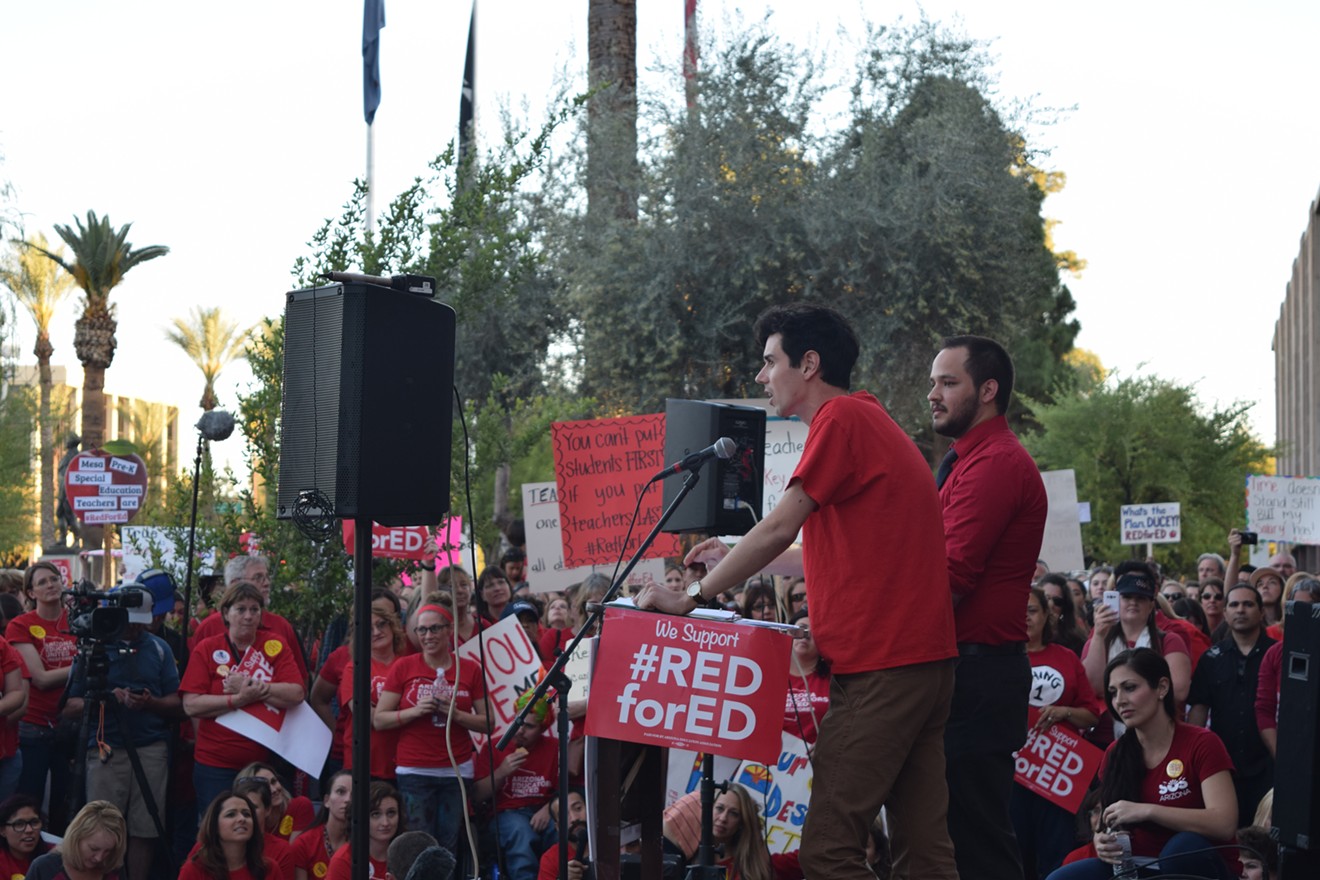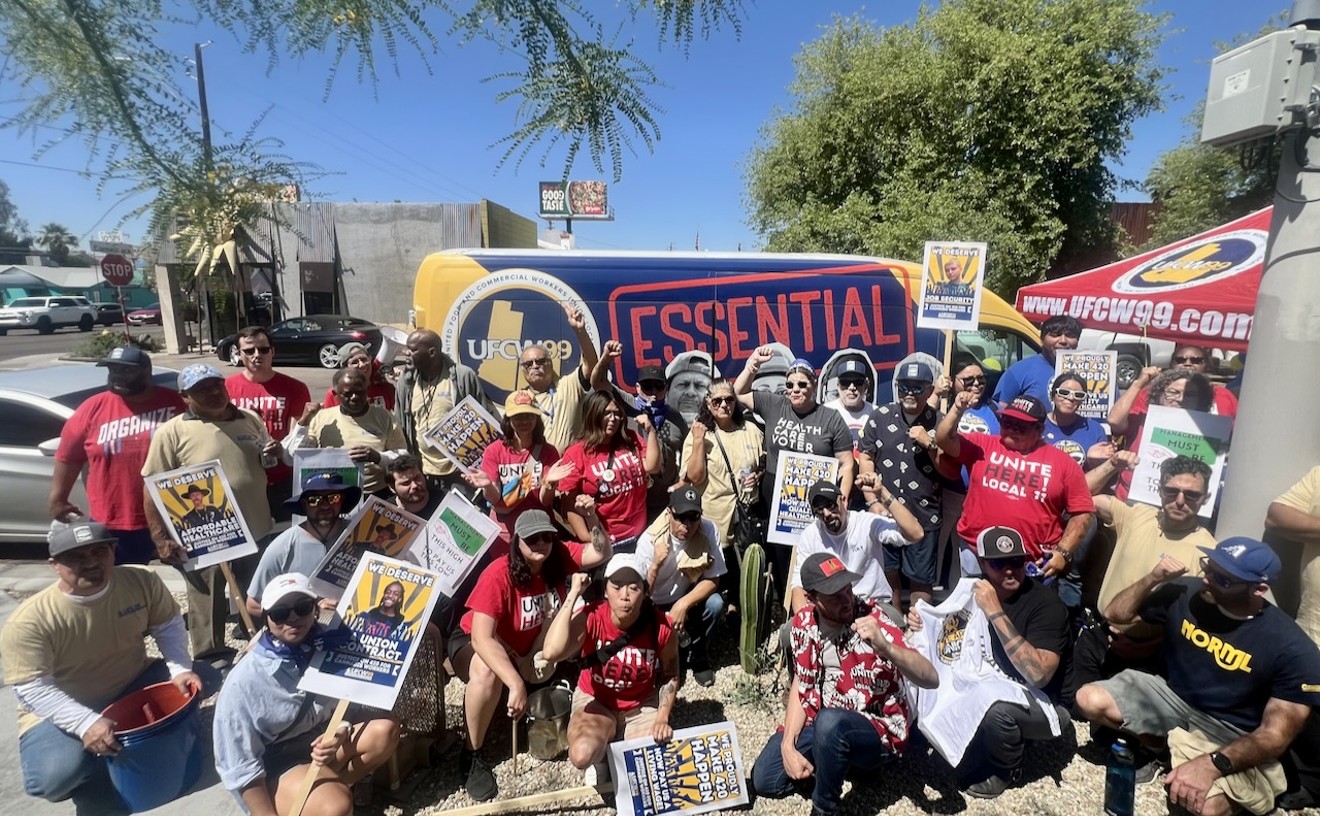Teachers in red packed the Capitol grounds last week to demand a 20 percent raise and increased school funding to recoup state dollars that were slashed during the recession. Meanwhile, the energy from the successful West Virginia teachers' strike is spreading. Thirty thousand Oklahoma teachers are on their second straight day of a walkout, and teachers in Kentucky protested changes to the state pension system at the state capitol.
Noah Karvelis, a leader of the Arizona Educators United movement, said that their organization is willing to choose a walkout date, which could occur sometime after next week's action on April 11.
On Monday, Karvelis wrote in the organization's Facebook group to address pressing questions about next steps. "First of all, we are absolutely willing to set a walk-out date," Karvelis wrote. "We must do whatever we can to achieve our goals."
But before committing to a walkout, Karvelis said that they need to gauge the number of teachers on their side and identify which school districts would participate. "We can't do a statewide walk-out with 200 schools participating. We absolutely must have widespread support throughout the state," Karvelis wrote.
There's a push-and-pull dynamic in the AEU group. Some educators advise a slow build to their movement, but a majority of group members seem enthusiastic about the idea of a mass walkout to shock the state Legislature into action.
"Yes, PLEASE SET A DATE," one teacher wrote back. "I understand we need to build support, but AEU members also need to see the whole timeline, not just one action step at a time.
"We are terrified that we are missing our moment to act now with Oklahoma and Kentucky," she added. In Oklahoma, where teachers haven't seen a pay raise in a decade, schools were closed for around 500,000 public school students.
AEU leaders have organized a "walk-in" next week to rally with parents and community members at schools, telling them why teachers want a pay raise — a precursor to a possible walkout.
The plan is to have teachers assemble outside their schools on the morning of April 11 with parents and community members. They'll march on campus and through the halls of their school with signs. By the time the first bell rings, classes will begin as usual.
In a live video message on the group's AEU Facebook page, organizer Dylan Wegela told viewers that next week's walk-in is akin to a test run. “If we can have a thousand schools walk in, we can have a thousand schools walkout," Wegela said.
Wegela teaches social studies at Marc T. Atkinson Middle School in Phoenix. He said that he has heard the sentiment from teachers that "we're not throwing the biggest punch we can right now."
In order to be successful, Wegela said a school walkout needs to happen as a mass action, not a halfhearted one. “We need to make sure that when we throw that punch, it knocks them out," Wegela told educators watching the video.

Teachers rallied at the Capitol last week. Arizona educators are among the lowest-paid in the nation.
Joseph Flaherty
In the video conference, Wegela joined fellow AEU leader Catherine Barrett and Arizona Education Association lobbyist Stephanie Parra. Parra said that debate over spending in the legislature is heating up as the session draws to a close — the 2018 session is scheduled to end on April 17.
"Ultimately, the legislature and the governor have to fear us, and they don't right now," Parra told the teachers. "The people that they fear right now are the people that get them re-elected every year."
Last week, thousands of teachers converged on the State Capitol, where AEU leaders announced their formal demands: a 20 percent raise in base pay, school funding to compensate for the millions of dollars that were cut after the 2008 recession, and increased compensation for education support professionals.
After AEU's announcement, reporters pressed Governor Doug Ducey, who argued that teacher pay has increased. At one point, Ducey appeared to defend Arizona's national ranking for teacher pay, saying that the state is improving. “I’m not bragging on 43rd," Ducey told the scrum. “I’m just saying we’re not last.”
In an emailed statement last week, Ducey's spokesperson Patrick Ptak said that the governor is committed to teacher raises and cited a 4.3 percent bump in the average teacher salary between 2016 and 2017.
"His goal is to pass a budget in the next few weeks that continues to increase our investment in public education, but we won't stop there," Ptak wrote. "We will continue each year to put more resources into K-12 education to better serve our teachers and students."
Nevertheless, Arizona's teacher salaries are at the bottom of the national heap, according to the Morrison Institute at ASU. And Arizona cut the largest percentage of the education budget per student between 2008 and 2015, more than every other state, according to the Center on Budget and Policy Priorities.












